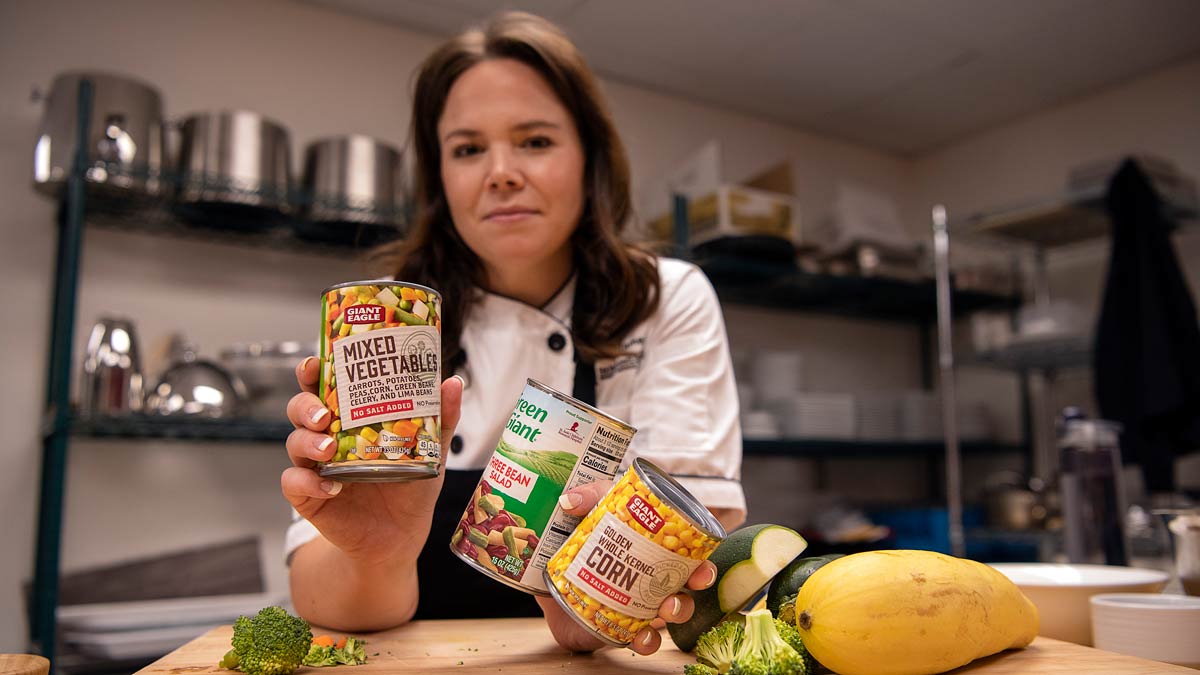Four nutrients to help your hormone imbalance - and two foods to avoid

It’s something nutritionist Lauren Blake, RD, LDN, CHWC, often sees in her office: women with hypothyroid, hyperthyroid or other hormone issues having difficulty losing weight.
“They’re fatigued, they have a foggy brain,” says Blake, RD, a manager of sports nutrition at the Ohio State Wexner Medical Center. “I especially see it among middle-aged women who are near menopause.”
The hormone problems affecting her clients include hyperthyroidism, in which the thyroid overproduces hormones; hypothyroidism, in which the thyroid doesn’t produce enough hormones; autoimmune disorder Hashimoto’s disease, which attacks the thyroid; thyroiditis, or the swelling of the thyroid; and goiter, an enlargement of the thyroid.
If you think you may suffer from a hormone imbalance, first establish a relationship with a primary care doctor who will run tests. If the results indicate an imbalance, your physician can determine whether medication and diet can address the underlying issue.
While Blake says there’s no magic diet plan that works the same way for everyone, anyone with a hormone imbalance can benefit from focusing on these four key nutrients:
1. Selenium
The highest concentration of selenium in our bodies is found in the thyroid gland, which needs the nutrient for optimal function. Patients who have an over-active thyroid should have their selenium levels tested, as too much selenium can have adverse effects.
Where you can find it: Brazil nuts are the easiest source, Blake says, because you need to eat so few that they won’t sabotage your daily calorie count. You would need to eat just two to three each day to get enough selenium. This nutrient also can be found in tuna, crab and lobster.What it will do for you: Selenium is an essential trace mineral and has been shown to have a profound effect on the immune system, cognitive function, fertility in both men and women and lower mortality rate.
2. Vitamin D
Vitamin D deficiencies are linked to Hashimoto’s disease, an autoimmune disease that attacks the thyroid.Where you can find it: Most of our vitamin D is synthesized from the sun. “A lot of people are deficient in vitamin D,” Blake says. “Especially here in Ohio.”
What it will do for you: Vitamin D provides bone-building nutrients, which are even more important because hyperthyroidism is known to cause bone loss.
3. Vitamin B12
About 30 percent of people with thyroid issues need more of this vitamin in their diets, Blake says, but deficiencies are common in the general public, too.Where you can find it: Vitamin B12 comes from meat and dairy. Blake recommends salmon and sardines as good sources. Those trying to eat a more plant-based diet could find B12 in nutritional yeast and in some cereals that have been fortified with the vitamin.
What it will do for you: Vitamin B12 is a nutrient that helps keep the body’s nerve and blood cells healthy and helps make DNA, the genetic material in all cells.
4. Iodine
Thyroid hormones are made of iodine, so too little or too much can affect your thyroid. Your doctor can determine how much iodine is in your diet.Where you can find it: In the United States, many table salts have iodine added to them, and most Americans aren’t deficient in iodine because they consume more than enough salt. Because of this, you shouldn’t take an iodine supplement unless your doctor recommends it.
What it will do for you: The body needs iodine to make thyroid hormones. These hormones control the body's metabolism and many other important functions. The body also needs thyroid hormones for proper bone and brain development during pregnancy and infancy.
Foods to approach with caution:
1. Cruciferous vegetables
Cruciferous vegetables are sources of goitrin, a chemical compound that can interfere with the synthesis of thyroid hormones. People who have an iodine deficiency, especially, should pay attention to how they feel when eating the veggies that produce goitrin, Blake says.Where you can find it: Cruciferous vegetables include broccoli, cauliflower, kale and cabbage. “I err on the side of caution,” Blake says, “and recommend that people with thyroid issues cook all of their cruciferous vegetables, because that denatures the goitrin.”
Why to approach with caution: Goitrin can negatively interfere with the synthesis of thyroid hormones. However, this is usually a concern only when coupled with an iodine deficiency. Heating cruciferous vegetables removes much or all of this potential goitrogenic effect.
2. Soy
Research hasn’t yet determined exactly how much soy affects people with thyroid issues, but it potentially can interfere with those hormones.Where you can find it: Blake recommends avoiding soy when it’s in highly processed foods, but if it’s in whole foods such as fresh edamame or tempeh, consuming in moderation is OK. If you’re considering soy milk, she says, almond milk may be a less risky and lower-calorie choice for a milk replacement.
Why to approach with caution: Soy is another potential goitrogen, but numerous studies have found that consuming soy doesn’t cause hypothyroidism in most people.
How quickly will I feel the effects of these diet changes?
“I see people who notice a difference in energy levels within the first week – usually within days,” Blake says. “Whole foods really give you great energy.”
Rates of weight loss are different for everyone, especially if thyroid medication has been prescribed.
“If we're eating good foods, we can see changes pretty quickly.”




